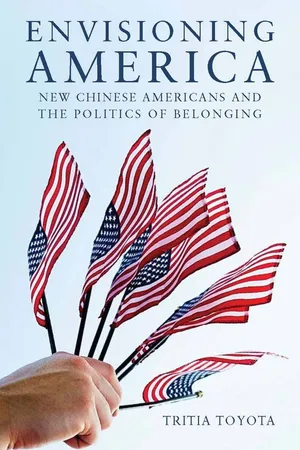
- 256 pages
- English
- ePUB (mobile friendly)
- Available on iOS & Android
About this book
Envisioning America is a groundbreaking and richly detailed study of how naturalized Chinese living in Southern California become highly involved civic and political actors. Like other immigrants to the United States, their individual life stories are of survival, becoming, and belonging. But unlike any other Asian immigrant group before them, they have the resources—Western-based educations, entrepreneurial strengths, and widely based social networks in Asia—to become fully accepted in their new homes.
Nevertheless, Chinese Americans are finding that their social credentials can be a double-edged sword. Their complete incorporation as citizens is bounded both by mainstream discourse in the United States, which paints them racially as perpetual foreigners, and by an existing Asian-Pacific American community not always accepting of their economic achievements and transnational ties. Their attempts at inclusion are at the heart of a vigorous struggle for recognition and political empowerment.
This book challenges the notion that Asian Americans are apathetic or apolitical about civic engagement, reminding us that political involvement would often have been a life-threatening act in their homeland. The voices of Chinese Americans who tell their stories in these pages uncover the ways in which these new citizens actively embrace their American citizenship and offer a unique perspective on how global identities transplanted across borders become rooted in the local.
Frequently asked questions
- Essential is ideal for learners and professionals who enjoy exploring a wide range of subjects. Access the Essential Library with 800,000+ trusted titles and best-sellers across business, personal growth, and the humanities. Includes unlimited reading time and Standard Read Aloud voice.
- Complete: Perfect for advanced learners and researchers needing full, unrestricted access. Unlock 1.4M+ books across hundreds of subjects, including academic and specialized titles. The Complete Plan also includes advanced features like Premium Read Aloud and Research Assistant.
Please note we cannot support devices running on iOS 13 and Android 7 or earlier. Learn more about using the app.
Information
APPENDIX 1
Selected Survey Results from the 2000 Democratic National Convention
| Korean | 26.2% |
| Chinese | 22.3% |
| Japanese | 17.9% |
| Filipino | 16.3% |
| Multiple ethnicities | 5.3% |
| Pacific Islander | 1.7% |
| Cambodian | 1.0% |
| Vietnamese | 0.3% |
| Other | 9.0% |
| United States | 50.1% |
| Korea | 20.1% |
| Philippines | 11.0% |
| India | 6.7% |
| China | 3.7% |
| Hong Kong | 2.3% |
| Japan | 1.7% |
| Taiwan | 1.3% |
| Cambodia | 0.7% |
| Pacific Islands | 0.3% |
| Vietnam | 0.3% |
| Other | 1.8% |
| Agree | Disagree |
|---|---|
| 244 | 55 |
| (81.6%) | (18.4%) |
| Total Asian Pacific American respondents = 299. | |
| Agree | Disagree |
|---|---|
| 272 | 27 |
| (91%) | (9%) |
| Total Asian Pacific American respondents = 299. | |
| Agree | Disagree |
|---|---|
| 290 | 11 |
| (96.3%) | (3.7%) |
| Total Asian Pacific American respondents = 301. | |
Table of contents
- ASIAN AMERICA - A series edited by Gordon H. Chang
- Title Page
- Copyright Page
- Table of Contents
- Acknowledgments
- Introduction
- ONE - Transforming the Field
- TWO - History and Race
- THREE - Envisioning America
- FOUR - California Lifestyles
- FIVE - Coming of Age
- SIX - Seeking New Allies, Building New Community
- SEVEN - Still the Problem of the Twenty-first Century
- APPENDIX 1 - Selected Survey Results from the 2000 Democratic National Convention
- APPENDIX 2 - Los Angeles County Communities with Chinese Populations (including Taiwanese) of More Than 20 Percent
- APPENDIX 3 - Socioeconomic Differences
- Notes
- References
- Index